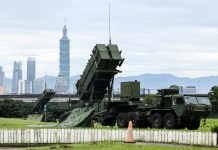Amid India-China border conflict, U.S. Special Presidential Envoy Marshall Billingslea will travel to Austria to discuss “mutually agreed topics related to the future of arms control” with Russian Deputy Foreign Sergei Ryabkov, the U.S. State Department said on Friday.
“The United States has extended an open invitation to the People’s Republic of China to join these discussions, and has made clear the need for all three countries to pursue arms control negotiations in good faith,” the State Department said.
U.S. President Donald Trump has frequently called for China to join the US and Russia in talks on a nuclear arms control agreement to replace the 2010 New START accord. New START, which imposes the last remaining limits on U.S. and Russian deployments of strategic nuclear arms to no more than 1,550 each, expires in February.
China, estimated to have about 300 nuclear weapons, has repeatedly rejected Trump’s proposal. Billingslea had said last week that he had agreed with Ryabkov on a time and place for the negotiations in June.
Earlier, the US has said it would like to hear more from China about its border dispute with India. For the first time in recent years, China’s tensions with India are figuring in US calculus for the region.
Speaking on the India-China border clashes, a senior US government official wondered whether the Chinese incursions into the Indian territory since 2015 were a negotiating tactic or “just a punch in the nose to demonstrate their superiority”.
However, the US has clubbed China’s friction with India along with its other long-standing regional disputes such as the South China Sea and Hong Kong issues to assert that “the actions that we’ve seen out of China have been not really constructive”, according to Assistant Secretary for East Asian and Pacific Affairs in the US State Department David Stilwell.
The US is watching the India-China border dispute “very closely” and finds the current activity at the Galwan valley and Pangong Tso as similar to the activity in the past on border disputes. In this respect, he mentioned Xi Jinping’s India visit in 2015 when the PLA invaded the same contested area “deeper and longer, with more people, than ever before historically. Then we saw the Doklam issue down near Bhutan, where we saw similar concerns”.
“We don’t have a lot of visibility and we don’t have a lot of open dialogue with our Chinese counterparts, and honestly I’d like to see more of that if we can,” he added.




